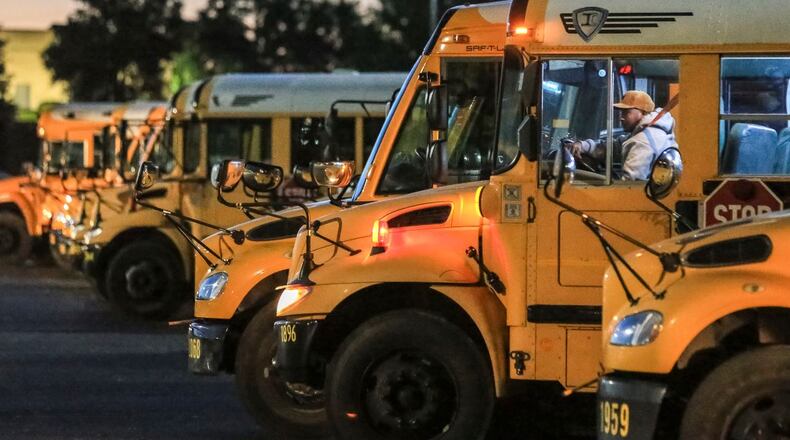DeKalb Schools Superintendent Steve Green's decision to fire seven bus drivers after nearly 400 called in sick two weeks ago was a turning point in a symbolic effort from drivers seeking better benefits and treatment.
Green has lauded the drivers for what he calls their critical role in the district’s mission to educate its children. However, in recent years, drivers say they have struggled to make ends meet as they faced pay cuts and healthcare cost hikes.
“We really love what we do. That’s first and foremost. But the administration has ignored our concerns for years,” said Sheila Bennett, one of the drivers fired for organizing the drivers’ demonstration. “When you look at what we make, you know we have to love what we do.”
The situation is not unique to DeKalb. School districts nationwide are contending with competition from improved economic conditions while trying to hire and retain quality drivers for jobs that were crafted as part-time and traditionally offered few benefits. But as school funding shortfalls make it tough to improve conditions for drivers, school administrators in surrounding districts worry their drivers may take similar measures as those in DeKalb.
“I think a lot of us are inspired by what’s happening in other parts of the country,” said Brandon Oliver of the General Defense Committee’s Atlanta branch. It is a pro-union advocacy group helping DeKalb drivers to organize. “It’s a tough job and it’s underappreciated. The larger hope … is to see other workers take inspiration from the workers in DeKalb.”
DeKalb school bus drivers are hesitant to talk about their organizing efforts, given it’s the reason Green used in his letter to terminate drivers. Drivers in other districts declined to talk, fearing similar retaliation. District officials from Atlanta Public Schools as well as Clayton and Gwinnett counties did not respond to emails or calls seeking information.
School bus driver jobs have been typically filled by workers such as moms filling their free time while their children were in school, or by retirees looking for low-maintenance work during their golden years. But people found themselves drawn to driving buses because of the potential impact they can have on children, and as a temporary job when the U.S. economy tanked and many employers purged their workforce.
“It was really designed to be a part-time job,” said Rick Grisham, Cobb County Schools’ executive director of transportation. “It’s a struggle to make it a career, because the pay isn’t up to the standard of providing a family. But the rewards are great ones.”
Grisham said all school districts are dealing with the changing face of who’s applying to be a driver these days, but funding shortfalls that have plagued schools in recent years make it harder to discuss improving pay and retirement benefits. The average driver in Cobb works about 6.25 hours each day, and earns $21,000 annually.
“It’s one of the hardest jobs in the school district,” he said. “We consider ourselves a vital part of the education process. It’s such a high liability, high stakes position, and it requires so much to keep a (Commercial Driver’s License). These folks have a lot they have to deal with.”
Grisham said the low salary and benefits can hinder districts seeking the best drivers. And the positions are critical to parents and children.
Johnthony Walker was a 24-year-old driver when his school bus ran off the road in Chattanooga, Tenn., in 2016, killing six children. Last month, he was sentenced to four years in prison. Investigators said he had been speeding at the time of the crash, and video from the bus showed he had his cell phone in his hand as children boarded.
Drivers start at $17 an hour in DeKalb, among the highest rates of pay in metro Atlanta’s school districts. Drivers are guaranteed six hours a day, about the norm in the region. Until 2009, DeKalb drivers were guaranteed up to eight hours each day, depending on their routes.
The lack of incentives leads to high turnover across the region. DeKalb Schools, for instance, hired 170 bus drivers, but accepted resignations from 160 in the 12-month reporting period ending April 2018, according to district information. At least 25 of those resignations — more than 15 percent — were by employees with the district fewer than six months. Fifty of those hired drivers never made it through training, according to a training roster The Atlanta Journal-Constitution received through an Open Records request.
Each summer, districts across metro Atlanta scramble to find drivers as school start dates close in.
Esten Huitt said she applied to be a school bus driver after the real estate office she was working in abruptly shuttered over 10 years ago during the national housing crisis. The driver pay was decent, and the job included significant time off, including summer months.
Many days, she’s at her bus by 5:30 a.m., runs her morning route, then trains newly hired drivers for three hours before grabbing lunch and heading out to take kids home. Most days, she gets home by 6:30 p.m. Before she was a trainer, she transported a high school band to and from football games for extra hours, getting home on those days after midnight.
Last year, she made about $31,000.
"It can be a bit much," she said about the high-maintenance job that comes with the low salary. "But I love my kids. That's why I stay in this job."
Bennett said most drivers see themselves as an extension of the classroom. Many tell stories of helping students with homework and teaching them respect. Sometimes, a student will confide in the driver about troubles at home, when money is low and the lights get cut off, or tell them there’s no food. Huitt said she has reported sexual abuse allegations to school administrators.
Bus drivers in metro Atlanta, are part of the Public School Employees Retirement System, which they say pays $210 per month in retirement, on average, after 20 years. Fulton County Schools officials said via email their drivers also are part of a district-run employee pension plan, and Gwinnett County School bus drivers are part of the Gwinnett Retirement System.
A recent Georgia Budget and Policy Institute report shed light on the effects of the shrinking amount the state pays to school districts for transportation. In 1991, the state covered 54 percent of student transportation costs. In 2017, it covered 15 percent.
Claire Suggs, until recently a senior education policy analyst with the Georgia Budget and Policy Institute, said districts over the years have found themselves spending more and more local revenue on their core services because of state funding cutbacks on everything from school system healthcare to rising teacher retirement costs. The cutbacks also raise safety concerns.
“A number of districts talked about challenges of managing a bus full of kids while you’re trying to drive,” she said. “Some districts are able to include monitors on buses, whose job it is to monitor children. But many more seem to want to.”
Organizing to address concerns collectively went a long way for the Seattle bus drivers, said Abraham Taylor, senior business agent for the Teamsters Local 174, which represents the bus drivers there. The starting wage has increased from $12 to $18 per hour since the union began representing drivers four years ago. The retirement plan, he said, essentially was a 401k, where they received $250 for an annual contribution of at least 10 times that amount. The district agreed to implement a pension program.
“This is the result of 50 or 60 years of school districts not valuing their transportation departments the same way they value their other areas,” he said. “Transportation departments always seem to fall behind. It is systematic, and no one is paying attention to that.”
Parent Kendra Borders said when she heard about the DeKalb bus driver sickout, she knew if drivers were taking themselves away from the children it had to be important. She said drivers perform an important role in school childrens' lives. She had no idea they were doing it for so little pay and little retirement.
“They mean more than, ‘Oh, they’re picking them up and dropping them off,’” said Borders, a working mom who balances her kids’ schedules with her job and frequent dialysis appointments to treat her kidney disease.
Recently, she was running late, and her three children — Murphy-Candler Elementary School students between the ages of 8 and 10 — were going to beat her home.
Then the phone rang. It was Huitt, her childrens’ bus driver, saying the children were still on the bus. Huitt realized no one was home and did not leave the children by themselves.
“She put them back on her bus and said she would drop them after she finished dropping off her high school students,” Borders said. “That’s the moment for me that changed my relationship with her. For her to take those extra measures for me … .
“She didn’t have to, and that’s a big deal.”
About the Author
Keep Reading
The Latest
Featured



